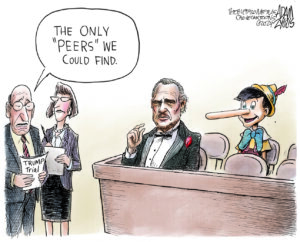Marie Cocco: An Inconvenient Candidate
Al Gore says he is not planning to run, but there he is, pitching the release of his global-warming documentary with all the vigor of a man whose sights are set on the White House.WASHINGTON — Oh, he would be an inconvenient candidate.
Al Gore says he is “not planning” to run for the White House again, but hasn’t “completely ruled it out.” Yet here he is among us, pitching the release on DVD of his global-warming documentary, “An Inconvenient Truth,” and hosting, along with the Internet-based political group Moveon.org, more than a thousand house parties on Saturday at which the film is to be shown and then discussed during a conference call with the star himself.
The high-tech coffee klatches could easily form the foundation of a full-blown presidential run, though it seems that Gore is campaigning more for an Oscar nomination than a presidential one. Let’s hope he gets the gold statuette and forswears, officially and unequivocally, another White House bid.
I wish for this not because I concur in the media’s savage depiction of Gore as an equivocating wearer of earth-tone clothes who sighs too audibly in debate, and kisses his wife too ostentatiously on stage. It is because the former vice president is far more impressive as an authoritative public citizen than he ever was as a presidential candidate.
Gore has been right, early and often, about the inconvenient truths that are the hallmarks of the Bush era.
He warned in his 2000 speech to the Democratic National Convention that a Bush White House would give free rein to “big tobacco, big oil, the big polluters, the pharmaceutical companies, the HMOs.” The Republican version of a Medicare drug plan, Gore said, “tells seniors to beg the HMOs and insurance companies for prescription drug coverage.”
Early in the fall of 2002, with Bush pounding the war drums to promote the invasion of Iraq and pummeling uncertain Democrats, Gore gave what was then — and is now — a comprehensive and accurate critique of the coming misadventure. Diverting the military from the unfinished work in Afghanistan would be a disaster, he warned. The lack of broad international support for an Iraq invasion would diminish America’s global standing and leave U.S. taxpayers to “shoulder hundreds of billions of dollars in costs on our own.”
The aftermath of the invasion would be more crucial to its outcome than the initial battles, he said. Without a plan for nation-building after the swift march to Baghdad, “the resulting chaos could easily pose a far greater danger to the United States than we presently face from Saddam,” Gore warned. That was five months before the invasion.
In June 2004, the former vice president decried the deceptions and manipulations that the Bush administration fed to the public as necessary to the war on terror. He spoke of the clash between “the ideological illusions upon which this administration’s policies have been based, and the reality of the world in which the American people live their lives.”
So Gore has an unerring knack for puncturing policy fictions, and for sometimes seeing the future. But he has unmistakably dull political instincts.
His 1988 presidential campaign was based on the fantasy that he could skip the Iowa caucuses and the New Hampshire primary, and run as a native Southerner in the Super Tuesday primaries concentrated throughout that region. He wound up splitting the Southern contests with the Rev. Jesse L. Jackson, and Northern liberal Michael Dukakis emerged as the big winner that day. Gore then went north to the New York primary, where he become entangled in a high-profile endorsement from New York City Mayor Edward I. Koch, who managed to turn the campaign into a racially charged referendum on Jackson’s attitude toward Jews.
Gore’s 2000 presidential bid was hobbled by his obvious uncertainty about how to treat Bill Clinton — the man who’d put him on the 1992 ticket as the vice presidential candidate, and so brought him to the verge of ascending to the Oval Office. The painful dance between the two was an awkward sideshow throughout the campaign. Gore won the popular vote and may well have taken Florida — and the presidency — had all votes been properly counted. Yet it shouldn’t have been that close for a vice president who could take some credit for an economic boom.
As for Gore’s role in the 2004 campaign, he endorsed Howard Dean only a month before Dean’s spectacular collapse in Iowa. Enough said.
Gore is an intellectual thoroughbred, but he has no feel for running the muddy track of presidential politics. For this, he does not deserve ridicule but a chance at respect. The nation doesn’t need another ambitious politician. It needs what Al Gore already has become — a fine public sage.
Marie Cocco’s e-mail address is mariecocco(at symbol)washpost.com.
(c) 2006, Washington Post Writers Group
Your support matters…Independent journalism is under threat and overshadowed by heavily funded mainstream media.
You can help level the playing field. Become a member.
Your tax-deductible contribution keeps us digging beneath the headlines to give you thought-provoking, investigative reporting and analysis that unearths what's really happening- without compromise.
Give today to support our courageous, independent journalists.









You need to be a supporter to comment.
There are currently no responses to this article.
Be the first to respond.